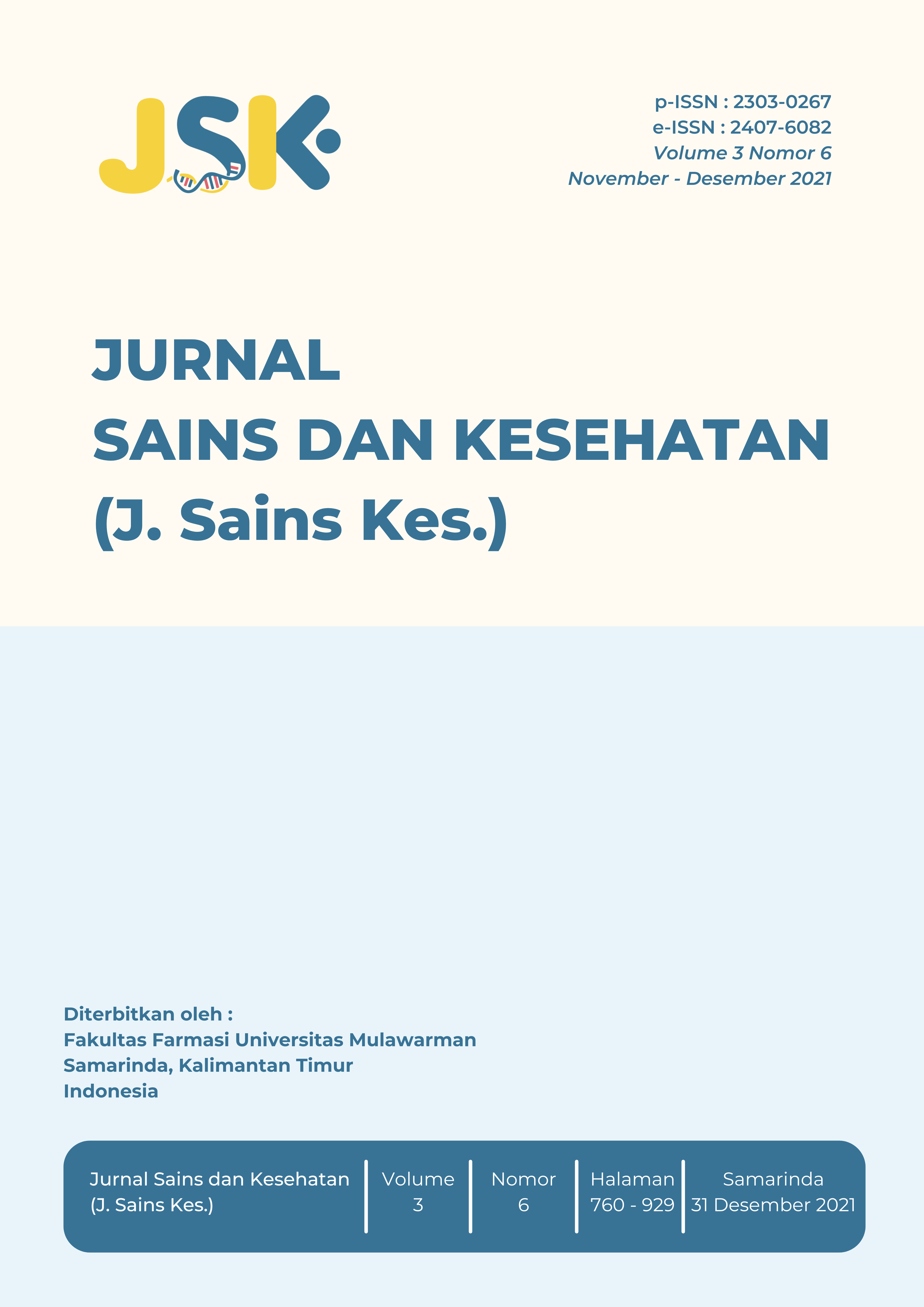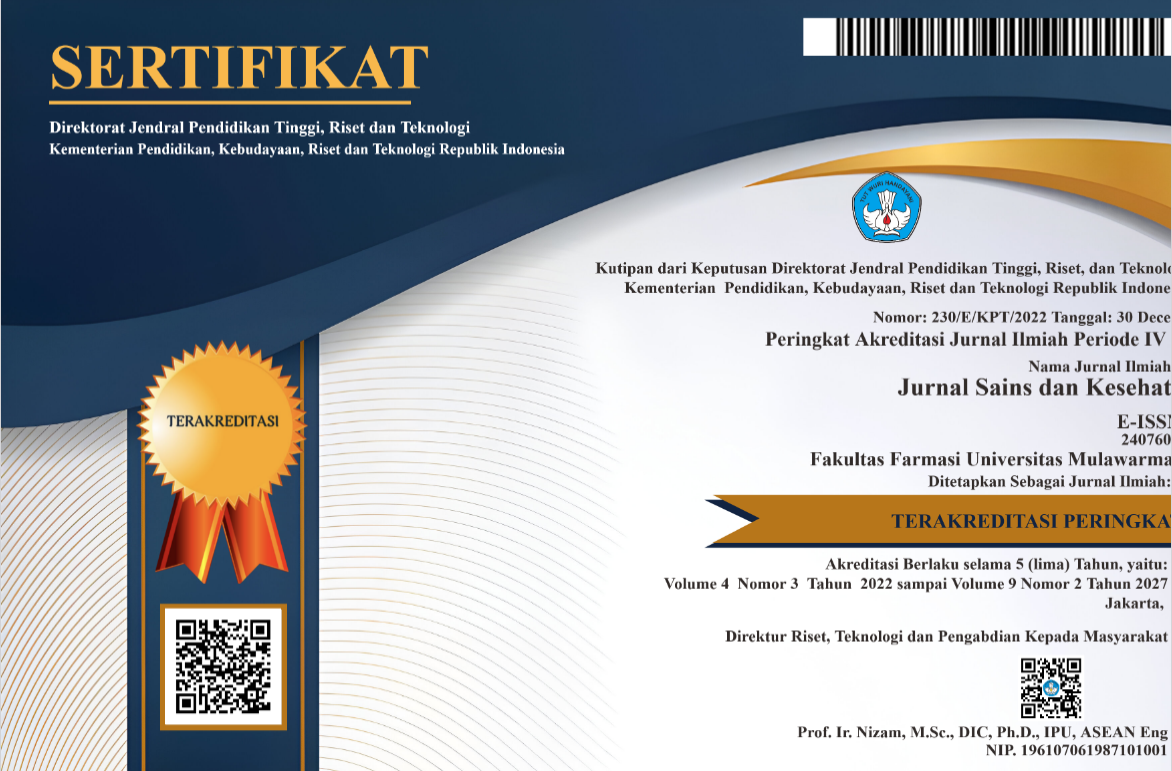Pengaruh Pemberian Minyak Ikan terhadap Hasil Terapi Pasien Skizofrenia Rawat Inap Berdasarkan Skala PANSS
Keywords:
minyak ikan, skizofrenia, randomized control trialAbstract
References
[1] S. Zahnia and D. Wulan Sumekar, “Kajian Epidemiologis Skizofrenia,” Majority, vol. 5, no. 5, pp. 160–166, 2016.
[2] P. Bozzatello, E. Brignolo, E. De Grandi, and S. Bellino, “Supplementation with Omega-3 Fatty Acids in Psychiatric Disorders: A Review of Literature Data,” J. Clin. Med., 2016.
[3] M. E. Berger et al., “Omega-6 to omega-3 polyunsaturated fatty acid ratio and subsequent mood disorders in young people with at-risk mental states: A 7-year longitudinal study,” Transl. Psychiatry, vol. 7, no. June, pp. 1–6, 2017.
[4] K. Satogami, S. Takahashi, S. Yamada, S. Ukai, and K. Shinosaki, “Omega-3 fatty acids related to cognitive impairment in patients with schizophrenia,” Schizophr. Res. Cogn., vol. 9, no. January, pp. 8–12, 2017.
[5] P. Bozzatello, M. L. De Rosa, P. Rocca, and S. Bellino, “Effects of omega 3 fatty acids on main dimensions of psychopathology,” Int. J. Mol. Sci., vol. 21, no. 17, pp. 1–29, 2020.
[6] M. J. Obermeier, “The Positive and Negative Syndrome Scale for Schizophrenia?: An Established Rating Instrument in Need of Clarification,” Dissertation, 2012.
[7] M. Obermeier et al., “Is the PANSS used correctly? A systematic review,” BMC Psychiatry, 2011.
[8] A. Triyono, “Newsletter PTTK&EK,” War. LPM, vol. 1, no. 13, pp. iii–v, 2012.
[9] M. Areda, “The role of omega-3 fatty acids in the treatment of schizophrenia through modification of membrane phospholipids,” Thesis, p. 50, 2016.
[10] K. Akter et al., “A review of the possible role of the essential fatty acids and fish oils in the aetiology, prevention or pharmacotherapy of schizophrenia,” J. Clin. Pharm. Ther., vol. 37, no. 2, pp. 132–139, 2012.
[11] N. Balasubramanian, “Omega 3 Fatty Acids: An Adjunct for Schizophrenia,” Int. J. Heal. Sci. Res., vol. 3, no. February, pp. 1–6, 2013.
[12] H. Jamilian, H. Solhi, and M. Jamilian, “Randomized, placebo-controlled clinical trial of omega-3 as supplemental treatment in schizophrenia,” Glob. J. Health Sci., vol. 6, no. 7, pp. 103–108, 2014.
[13] M. C. Hsu, Y. S. Huang, and W. C. Ouyang, “Beneficial effects of omega-3 fatty acid supplementation in schizophrenia: Possible mechanisms,” Lipids Health Dis., vol. 19, no. 1, pp. 1–17, 2020.
[14] A. I. Zugno et al., “Effects of omega-3 supplementation on interleukin and neurotrophin levels in an animal model of schizophrenia,” An. Acad. Bras. Cienc., vol. 87, no. 2, pp. 1475–1486, 2015.
[15] G. Grosso et al., “Role of omega-3 fatty acids in the treatment of depressive disorders: A comprehensive meta-analysis of randomized clinical trials,” PLoS One, vol. 9, no. 5, 2014.
[16] R. P. Patrick and B. N. Ames, “Vitamin D and the omega-3 fatty acids control serotonin synthesis and action, part 2: Relevance for ADHD, bipolar disorder, schizophrenia, and impulsive behavior,” FASEB J., vol. 29, no. 6, pp. 2207–2222, 2015.
Downloads
Published
Issue
Section
Deprecated: json_decode(): Passing null to parameter #1 ($json) of type string is deprecated in /home/jskff/public_html/plugins/generic/citations/CitationsPlugin.php on line 68
How to Cite
Most read articles by the same author(s)
- Indah Woro Utami, Eka Kumala Retno, Warrantia Citta Citti Putri, Aktivitas Antibakteri Air Perasan Jeruk Purut (Citrus hystrix DC.) terhadap Bakteri Salmonella thypi secara In Vitro , Jurnal Sains dan Kesehatan: Vol. 5 No. 3 (2023): J. Sains Kes.
Similar Articles
- Tantri Rachmayani, Akrom Akrom, Titiek Hidayati, Pengaruh Minyak Biji Jinten Hitam (Nigella sativa L) terhadap Kadar Interleukin-4 , Jurnal Sains dan Kesehatan: Vol. 3 No. 6 (2021): J. Sains Kes.
- Yuli Ainun Najih, Dita Nurlita Rakhma, Arum Sari Diyah Utami, Rina Andayani, Formulasi Emulgel Minyak Ikan Salmon dengan Gelling Agent Na-Alginat dari Alga Coklat (Sargassum sp) , Jurnal Sains dan Kesehatan: Vol. 3 No. 1 (2021): J. Sains Kes.
- Ersanda Nurma Praditapuspa, Angelica Kresnamurti, Ana Khusnul Faizah, Uji Aktivitas Analgesik Minyak Ikan Salmon Pada Mencit Putih (Mus Musculus) Jantan Galur Balb/C Dengan Metode Hot Plate , Jurnal Sains dan Kesehatan: Vol. 2 No. 4 (2020): J. Sains Kes.
- Karunita Ika Astuti, Fitriyanti Fitriyanti, Norhasanah Norhasanah, Uji Aktivitas Antidiabetes Minyak Ikan Sepat Rawa (Trichopodus Trichopterus) Asal Kalimantan Selatan , Jurnal Sains dan Kesehatan: Vol. 3 No. 4 (2021): J. Sains Kes.
- Ayu Aprilya, Rahmadevi Rahmadevi, Indri Meirista, Formulasi Nanoemulsi dengan Bahan Dasar Minyak Ikan (Oleum Iecoris Aselli) , Jurnal Sains dan Kesehatan: Vol. 3 No. 3 (2021): J. Sains Kes.
- Hilmiati Wahid, Suhra Febrina Karim, Nurhikma Sari Nurhikma Sari, Formulasi Sediaan Krim Anti-aging dari Ekstrak Kolagen Limbah Sisik Ikan Bandeng (Chanos chanos) , Jurnal Sains dan Kesehatan: Vol. 4 No. 4 (2022): J. Sains Kes.
- Asti Vebriyanti Asjur, Syaifullah Saputro, Tamzil Azizi Musdar, Mifta Khaerati Ikhsan, Formulasi dan Uji Efektivitas Shampo Antiketombe Minyak Atsiri Seledri (Apium graveolens) terhadap Jamur Candida albicans , Jurnal Sains dan Kesehatan: Vol. 4 No. 5 (2022): J. Sains Kes.
- Norhayati Norhayati, Andika Andika, Aris Purwanto, In Silico Study of Bajakah Compounds (Spatholobus suberectus) to ProteaseSARS-CoV-2 Inhibitor , Jurnal Sains dan Kesehatan: Vol. 5 No. 2 (2023): J. Sains Kes.
- Winda Puspita Salim, Yetty Octavia Hutahaean, Fransiska Anggreni Sihotang, Pengaruh SSRIs Untuk Meningkatkan Independensi Fungsional Pada Pasien Depresi Pasca Stroke , Jurnal Sains dan Kesehatan: Vol. 3 No. 3 (2021): J. Sains Kes.
- Haeruddin Haeruddin, La Harimu, Rahmanpiu Rahmanpiu, Dahlan Dahlan, La Rudi, La Ode Muhamad Alibonto, Citra Wati, Nurul Aulia Hikmah, Optimalisasi Nilai Bilangan Penyabunan Minyak Kelapa Hasil Pengolahan dengan Pemanasan Terkontrol , Jurnal Sains dan Kesehatan: Vol. 5 No. 5 (2023): J. Sains Kes.
You may also start an advanced similarity search for this article.




